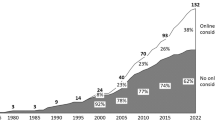Abstract
I study a sequential process in which different pairs of traders bargain over the terms of trade of an indivisible good. I consider bothone-sided andtwo-sided offers based bargaining at the stage-game level. The sequential process is modelled as an infinite stage-game of incomplete information and the paper studies the efficiency properties of its equilibria. It is shown: With one-sided offers, all equilibria are long-run ex post efficient; with two-sided offers, examples of equilibria are constructed with widely varying efficiency properties.
Similar content being viewed by others
References
P. Aghion, P. Bolton, C. Harris, B. Jullien, 1991, Optimal learning by experimentation, Review of Economic Studies 58, 4, 621–655.
A. Ausubel and R. Deneckere, 1993, Efficient sequential bargaining, Review of Economic Studies 60, 3, 435–461.
L. Blume and D. Easley, 1993, Rational learning and rational expectations, Mimeo, Cornell University.
L. Blume and D. Easley, 1992, What has the rational learning literature taught us?, Mimeo, Cornell University.
K. Chatterjee and W. Samuelson, 1983, Bargaining under asymmetric information, Operations Research 31, 835–51.
C. d’Asperamont and P. Gerard-Varet, 1979, Incentives and incomplete information, J. of Pub. Econ 16, 25–45.
S. Goyal, 1990, Essays on the economics of learning, Ph.D Thesis, Cornell University.
S. Goyal, 1991, On the possibility of efficient bilateral trade, Mimeo, Econometric Institute, Erasmus University, Rotterdam.
S. Goyal, 1993, On the possibility of efficient bilateral trade, Mimeo, Econometric Institute, Erasmus University, Rotterdam.
J. Harsanyi, 1967–68, Games with incomplete information played by Bayesian players, Management Science 14, 159–82, 320–334, 481–520.
J. Jordan, 1991, Bayesian learning in normal form games, Games and Economic Behavior 3, 60–81.
R. Myerson and M. Satterthwaite, 1983, Efficient mechanisms for bilateral trade, Journal of Economic Theory 29, 265–81.
Symposium on non-cooperative bargaining, 1989, Journal of Economic Theory 48, 1.
R. Wilson, 1987, Game theoretic analysis of trading processes, in: Advances in economic theory, ed., Truman F. Bewley, Cambridge University Press.
R. Wilson, 1977, A bidding model of perfect competition, Review of Economic Studies 44, 511–518.
A. Wolinsky, 1990, Information revelation in a market with pairwise meetings, Econometrica 58, 1–23.
Author information
Authors and Affiliations
Additional information
This paper is based on Chapter 1 of my Ph.D thesis.
Rights and permissions
About this article
Cite this article
Goyal, S. On the possibility of efficient bilateral trade. Economic Design 1, 79–102 (1994). https://doi.org/10.1007/BF02716615
Issue Date:
DOI: https://doi.org/10.1007/BF02716615




